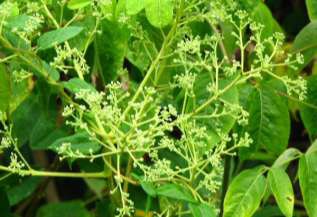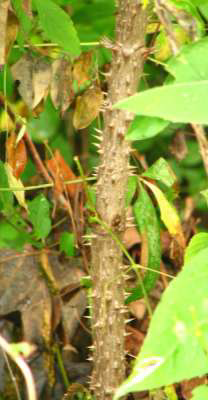 Devil’s Walking Stick
Devil’s Walking Stick
(Aralia spinosa L.)
|
Classification |
| Kingdom: |
Plantae |
| Division: |
Magnoliophyta |
| Class: |
Magnoliopsida |
| Order: |
Apiales |
| Family: |
Araliaceae |
| Genus: |
Aralia |
| Species: |
A. spinosa |
 Characteristics: Aralia spinosa, known as Devil’s Walking Stick, is a spiny shrub or sometimes a small tree. The twigs are very thick, light brown colored, and covered with many straight sharp spines, especially at the nodes. The bipinnately compound leaves are 16 to 30 inches long and clustered at the ends of the twigs. The leaflets are numerous and are mostly paired; they are ovate to broadly elliptical in shape, and 2 to 3.5 inches long, with finely serrate edges. The leaflets are dark green above and lighter below, often with prickles on the mid-vein on the underside. The small white flowers have 5 petals in a large cluster 8 to16 inches long. Devil’s Walking Stick flowers in the summer and the fruits, numerous black drupes about 0.25 inches in diameter, mature in late fall. It propagates by sprouting from the roots to form cloned thickets.
Characteristics: Aralia spinosa, known as Devil’s Walking Stick, is a spiny shrub or sometimes a small tree. The twigs are very thick, light brown colored, and covered with many straight sharp spines, especially at the nodes. The bipinnately compound leaves are 16 to 30 inches long and clustered at the ends of the twigs. The leaflets are numerous and are mostly paired; they are ovate to broadly elliptical in shape, and 2 to 3.5 inches long, with finely serrate edges. The leaflets are dark green above and lighter below, often with prickles on the mid-vein on the underside. The small white flowers have 5 petals in a large cluster 8 to16 inches long. Devil’s Walking Stick flowers in the summer and the fruits, numerous black drupes about 0.25 inches in diameter, mature in late fall. It propagates by sprouting from the roots to form cloned thickets.
Habitat: This plant typically grows in the forest understory or along the edges of forests.
Range: It can be found from Pennsylvania westward to Missouri and southward to Texas.
Native American Uses: Infusions and decoctions were made from Devils Walking Stick as a dermatological aid, an emetic, a carminative, and to treat toothaches and rheumatism. Decoctions made from the roots were used as a salve for boils and sores, as well as to reduce fevers. The young leaves were eaten if gathered before the prickles harden; they were chopped finely and cooked as a potherb. The Cherokee and Rappahannock Indians are among the Native American tribes known to have utilized this species.
Colonial Uses: Devil’s Walking Stick was introduced into cultivation in 1688 and the bark of the root and the berries were used in medicines.
Modern Uses: Devil’s Walking Stick is still grown for its decorative foliage.